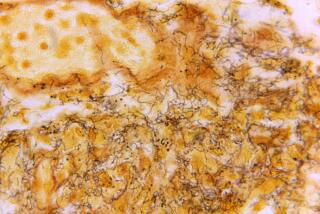A Deadly Disease That Is Getting Younger
- Share via
It has been more than 15 years since HIV/AIDS struck our nation. Since then, we have celebrated important progress against this epidemic. New, improved drugs and treatments are enabling thousands of people with HIV to continue to live fulfilling and productive lives, and rates of new cases have reached historic lows.
But we must not be lulled into complacency. This epidemic is far from over. In the time that it takes the average person to finish reading this article, 11 more people around the world will become infected with HIV. Last year, the global AIDS rate grew by 10% with more than 33 million people now infected with HIV worldwide.
In the United States, there are 40,000 more people infected each year. And half of all new infections occur in people under 25. According to the Centers for Disease Control and Prevention, more than 110,000 young people 13 to 29 have been diagnosed with AIDS in the United States. Since it takes years for symptoms to show up as infections, we know that most people diagnosed with AIDS in their 20s probably were infected as teenagers.
With so many young children contracting this disease, adults have a duty to respond strongly. An important way to do that is to help them make responsible, informed decisions based on comprehensive information and honest dialogue. The Clinton administration has taken action to make sure young people have the information they need. The president has directed all federal agencies with programs that serve young people to identify ways to help spread the word about HIV prevention and education. We have increased prevention funding at the CDC and have launched a prevention marketing initiative that targets young people with straight talk about how they can protect themselves from HIV/AIDS.
But the most important thing we can do to protect our children from the threat of HIV/AIDS is to take responsibility in our communities, in our schools and in our homes. All of us must speak candidly to our children about the dangers and risks of AIDS. And young people must be involved in planning and implementing services that affect their health and well-being. I commend the young people who are providing outreach, education and support to other young people in schools, clinics and on the streets. They are often our best messengers, because their voices are heard loudest among their peers.
On Tuesday, President Clinton unveiled new strategies to address the emerging crisis of AIDS orphans: It is estimated that as many as 40 million children worldwide will be without a parent by 2010. My husband, the vice president, is helping to assure that people with HIV/AIDS in this country have the support they need through $220 million in new federal grants--$27.4 million of that to California and $8.8 million to Los Angeles County--to enable communities to provide housing and other critical support services for people with HIV/AIDS.
This new effort builds on six years of sustained attention to HIV/AIDS. During this administration, funding for AIDS research at the National Institutes of Health has increased by more than 50% and the Food and Drug Administration has approved dozens of new drugs for AIDS and AIDS-related conditions. Funding for the Ryan White Care Act has more than tripled, providing critical medical care and support services to thousands of people living with HIV/AIDS, and this year we began a new $156-million effort to address the crisis HIV/AIDS has presented for racial and ethnic minorities.
The president also awarded the first federal grants through the Substance Abuse and Mental Health Administration to develop comprehensive mental health services for persons living with HIV/AIDS and their families and partners. This is an important first step toward addressing the impact of long-term disease on mental health.
We have come a long way in the past 15 years and we are moving in the right direction. But no matter how good the treatment, no matter how effective the drug combination, we have not stopped this disease. And we cannot rest until we do. Too many young lives depend on it.
More to Read
Sign up for Essential California
The most important California stories and recommendations in your inbox every morning.
You may occasionally receive promotional content from the Los Angeles Times.













